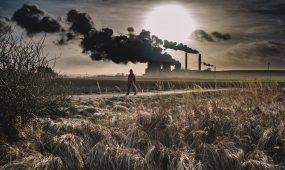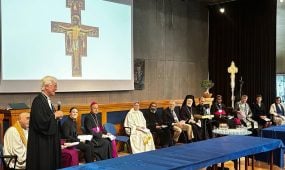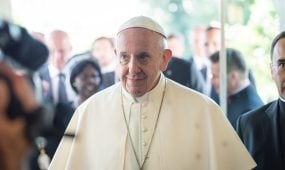For whom the bell tolls
News
“The good news is that we still have time to turn this situation around, as long as we collectively and urgently take responsibility and act,” says The Very Rev’d Dr Peter Catt as he call us to an ‘ecological conversion’ on Earth Overshoot Day

No man is an island,
Entire of itself.
Each is a piece of the continent,
A part of the main.
If a clod be washed away by the sea,
Europe is the less.
As well as if a promontory were.
As well as if a manor of thine own
Or of thine friend’s were.
Each man’s death diminishes me,
For I am involved in mankind.
Therefore, send not to know
For whom the bell tolls,
It tolls for thee.
Advertisement
So wrote the 17th Century English poet and Anglican Dean, John Donne.
The interconnectedness of all things is the underlying theme of Donne’s poem. The bell signals to us that we are in this life together – in the Christian imagination, we are all part of the same divine ‘economy’.
Over the last few years, I have increasingly encountered people who are concerned about threats to our common home, including the alarming dieback in bee colonies, species extinction, the plastic that is choking our sea life, the breakdown in the recycling system internationally, the thousands of abandoned mines leaching poison into our precious water systems and farmlands across Queensland, and the prospect of global heating causing catastrophic climate change.
What connects me, and the many others whom I speak with, to these very real concerns is the recognition of our collective failure to honour the very interdependence that Donne illustrates in his poem.
Monday 29 July is ‘Earth Overshoot Day’, marking the day when humanity’s demands for ecological resources, including fish, forests and fresh water, exceed what the Earth can renew in a year.
Our unreasonable demands on the Earth are driven by self-centred attitudes and the disconnect we exhibit towards our common home, as we over-consume.
Advertisement
Our consumer-driven approach is increasingly perpetuated by self-centred marketing that intentionally puts ‘me’ first. Think of the many popular manufactured goods, including tech and cars, and intangible goods, such as insurance products, that preface their product names with ‘i’, ‘you’ or ‘me’.
As a result, I cannot help wondering how this egocentric mindset is affecting our relationships with each other and with the home we share.
Our laissez faire approach causes us to avoid taking responsibility, and so we leave it to others. These in turn leave it to others and so on. This is clearly not working for us or for the Earth.
Last October the Intergovernmental Panel on Climate Change (IPCC) warned that we have just 12 years to avoid catastrophic climate, so passing the buck is not an option. In May, another United Nations report suggested we are heading towards the extinction of one million species.
The good news is that we still have time to turn this situation around, as long as we collectively and urgently take responsibility and act.
It is pleasing to see that big business is increasingly taking the collective responsibility to recognise our interdependence. BHP recently announced a five-year US$400 million Climate Investment Program to reduce emissions. Parts of civil society are also getting on board with an increasing push to move from a linear economy to a ‘circular economy’, putting the ‘user’ rather than the ‘consumer’ at the centre, focusing on renewable energy and the elimination of waste.
Related Story
 Reflections
Reflections
Climate change is indeed a moral problem
Surely the time has come for our political leaders across all parties to come together and lead in a shared vision to protect our common home through robust policies and urgent action.
As our representatives, they will only do this if we ask them to – it is how our democratic system works.
Ultimately, in order to renew the Earth and save our common home we need an ‘ecological conversion’– as both Pope Francis and Rowan Williams have said.
As Christians we can lead this deeper call for transformation in both our attitudes and behaviour. This is why we are marking Monday’s Earth Overshoot Day.
On Monday, a number of cathedrals across the country, including St John’s Anglican Cathedral in Brisbane, will be ringing their bells for 12 minutes between 11.48am and midday – representing the limited years that the IPCC has warned that we have to avoid catastrophic climate change.
The cathedrals and churches who will be involved in bell ringing and liturgies across the country are listed below.
If you would like to mark Earth Overshoot Day as an individual and with your church, there are a number of activities you can do, including:
- Tolling your Church bells or light a candle from 11.48am, for the 12 minutes until midday, marking the 12 years that the IPCC has foreshadowed as a critical tipping point.
- Praying for all people to see the ecological crises in our midst and for ‘ecological conversion’.
- Telling others in your church, online communities and politicians about this day, and why you are marking it.
- Acting as people of faith by making a commitment to Living the Change.
- Organising your own Earth Overshoot Day event and sharing your event on Facebook with the help of these liturgical and social media resources.
Cathedrals involved in bell ringing and liturgies:
St John’s Anglican Cathedral, Brisbane, QLD
St Boniface Cathedral, Bunbury WA
St David’s Cathedral, Hobart, TAS
St Peter’s Cathedral, Adelaide, SA
Holy Trinity Cathedral, Wangaratta, VIC
St Paul’s Cathedral, Bendigo, VIC
Cathedral Church of Christ the King, Grafton, NSW
Churches taking part:
St Andrew’s Church, Indooroopilly
St Mary’s Church, Kangaroo Point
Holy Trinity Church, Fortitude Valley
Anglican Parish, Ballina
St Paul’s, Myrtleford
St Anne’s Anglican, Highfields (Toowoomba)
Good Shepherd Anglican Community, Bundaberg
Supporters
Common Grace
Australian Religious Response to Climate Change
Uniting Church of Australia, Queensland Synod
Social Responsibilities Committee, Anglican Church Southern Queensland






